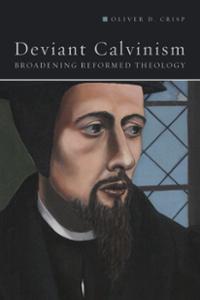 Dr. Oliver Crisp’s Deviant Calvinism: Broadening Reformed Theology (kindle) has been blessed with excellent publicity. In several places, you can read or hear Dr. Crisp’s thoughts on the book, and get a good sense of what it is about. In the most recent episode of the trinities podcast, I discuss with him just how broad he thinks the Reformed tradition is. Next week we get into the sticky issue of libertarian Calvinism.
Dr. Oliver Crisp’s Deviant Calvinism: Broadening Reformed Theology (kindle) has been blessed with excellent publicity. In several places, you can read or hear Dr. Crisp’s thoughts on the book, and get a good sense of what it is about. In the most recent episode of the trinities podcast, I discuss with him just how broad he thinks the Reformed tradition is. Next week we get into the sticky issue of libertarian Calvinism.
Here are some of his other interviews, in which Dr. Crisp
- introduces his book @ Fortress Press Live.
- is interviewed by Dr. Anthony Gill on the Research on Religion podcast.
- is interviewed by Kevin Emmert for Christianity Today
[Crisp:] I see a lot of misrepresentations of Reformed theology, among people both inside and outside the Reformed tradition. Many people think Reformed theology coalesces around five points or around the soteriological “doctrines of grace” rather than around historic confessions. And I see a lot of Calvinists who aren’t confessional, when in fact the Reformed tradition very much is.
[Crisp] The Confessions are norms of a sort, but not immutable norms. They are subordinate to Scripture. In principle, all creeds and confessions are revisable in light of God’s Word. In fact, the Reformed Confessions do indeed contain things that we might balk at today, because we read Scripture differently.
- Dr. Crisp comments in an interview by Mark McDowell @ Reformation21:
…the Reformed community has tended to reify a particular time, particular places, particular thinkers, at the expense of the ongoing challenge of being “always reforming.” So, for instance, we look to the sixteenth century, to the Magisterial Reformers, to the confessions that grew out of that formative period, and the great statements of theology that are a gift to the church and think “That is it: that is the high water mark. Everything since then has been going downhill.”
Like a number of other theologians today, I think of myself as a Reformed Catholic. For me, Reformed theology is a species of catholic theology that can be distinguished from other streams of catholic theology by certain distinctive emphases.

…the Reformed community has tended to reify a particular time, particular places, particular thinkers, at the expense of the ongoing challenge of being “always reforming.” So, for instance, WE look to the sixteenth century, to the Magisterial Reformers, to the confessions that grew out of that formative period, and the great statements of theology that are a gift to the church and think “That is it: that is the high water mark. Everything since then has been going downhill.”
Really cool quote – leaves open to inspection of course who the “we” might be, I think that historic sense of belonging is lacking in the more free charismatic evangelical “traditions” (although these streams are hardly justifiably traditions yet)
Comments are closed.